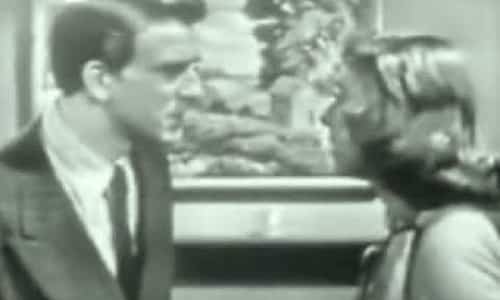BARRY McCANN discusses the early television production of an M.R. James ghost story, The Lost Will of Dr Rant (NBC, 1951)

Adaptations of M.R. James stories are a mainstay of screen drama, and the most successful have to be the BBC versions that largely formed the 1970s Ghost Story for Christmas. In 2013, Mark Gatiss recalled the classic format for a yuletide dramatization of The Tractate Middoth, a story that had been the basis of television’s earliest take on M. R. James when America’s NBC network staged a version for the supernatural anthology series, Lights Out.
Having started as a radio show, Lights Out transferred to television in 1949 and was originally hosted by Jack La Rue (later Frank Gallop).
Each episode opened with a close up of the host’s face announcing “Heeelllooo”, before pulling back to reveal a seemingly disembodied head illuminated by a nearby candle. The host then initiated the evening’s tale with the words “Lights Out!”.
The show was broadcast live while simultaneously recoded on kinescope for reruns. And for the 1951 season, Doris Halman scripted a version of The Tractate Middoth under the title The Lost Will of Dr Rant. It opens in a Boston academic library where John Eldred (Russell Collins) approaches librarian Bill (Leslie Nielsen), requesting the book of the title. He goes up to the archive to fetch the volume, but finds it missing. A mysterious man in black is stood near with his back to the world, reading what could be the very book.
Bill returns downstairs and informs Eldred that an old, scholarly looking gentleman is reading the book requested. A nervous Eldred requests it be sent to him when free, before rushing off for his train home. As the library closes, He returns upstairs to find the man still there. When challenging him, the stranger turns to reveal he has no eyes. A horrified Bill screams and faints.
Cut to Boston railway station some weeks later, where Mrs. Simpson (Eve Condon) and her daughter Mary (Pat Englund) have been unsuccessfully searching for a book that would prove the mother’s right of inheritance from her late Uncle John. At the same station is Bill, who bumps into his colleague, George (John Gerstad). Bill is en route to New Hampshire to recover from his ordeal and remains convinced of what he saw. But George, who found Bill seconds after he screamed, insists no old man was there. Going for his train, something scares Bill and he runs the other way. It is the mysterious man with no eyes.
A week later, Bill is lodging at the Simpson’s house having run onto their train back in Boston panic stricken before collapsing. Mrs. Simpson tells him of a book by her late uncle, Dr John Rant, which contained his will to her, but had disappeared before he died. Bill recalls that to be the name of the author of The Tractate Middoth, which had been donated to the library before his death, and concludes its Hebrew scripture may be the legacy his hosts have been seeking.
The estate had been awarded to the heir in the previous will, John Eldred, who has since been searching for out books missing from Rant’s catalogue to destroy the evidence. Bill realises his mysterious stranger is Rant’s ghost, guiding him to the Simpsons and help recover the book.
Bill returns to Boston to find the volume has been sent on to a post office in Brentfield for Eldred to collect. When Eldred arrives there to claim his package, he is confronted by the ghost and Bill arrives to find him on the floor, seemingly dead. He takes the book and the will is identified within its text. With Mrs. Simpson now restored to wealth, Bill becomes engaged to Mary.
While basically following James’s story, Halman’s adaptation does make obvious changes, such as the relocation to America and the hero, William Garret, renamed simply Bill. His eventual relationship with Miss Simpson, which James mentions in passing at the conclusion of his tale, is romantically fore grounded as the play’s tag ending. And being a 20 minute, studio bound live broadcast, the script does skimp over some story details.
Production wise, it is basically radio with pictures and stilted by today’s standards. The library scenes, staged in a tiny set with a couple of bookcases and fixed camera, are particularly ineffective. Dr Rant’s ghost strolls in and out of his scenes with eyes closed and lids blackened, though we only get to see fleeting glances of his face.
But, of course, this was two years before The Quatermass Experiment and was probably spooky stuff back in the flickering shadows of 1951 black and white television. And for scholars of vintage television, it remains a charming must see.
Episodes of Lights Out are out on DVD in America and available to view on You Tube, including The Lost Will of Dr Rant. And I am working my way through them as we speak – Lights Out!

